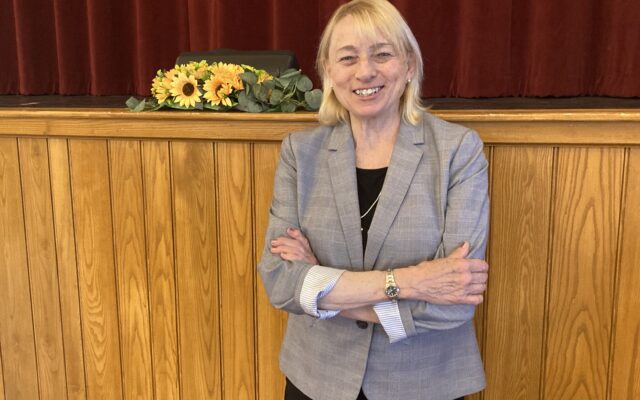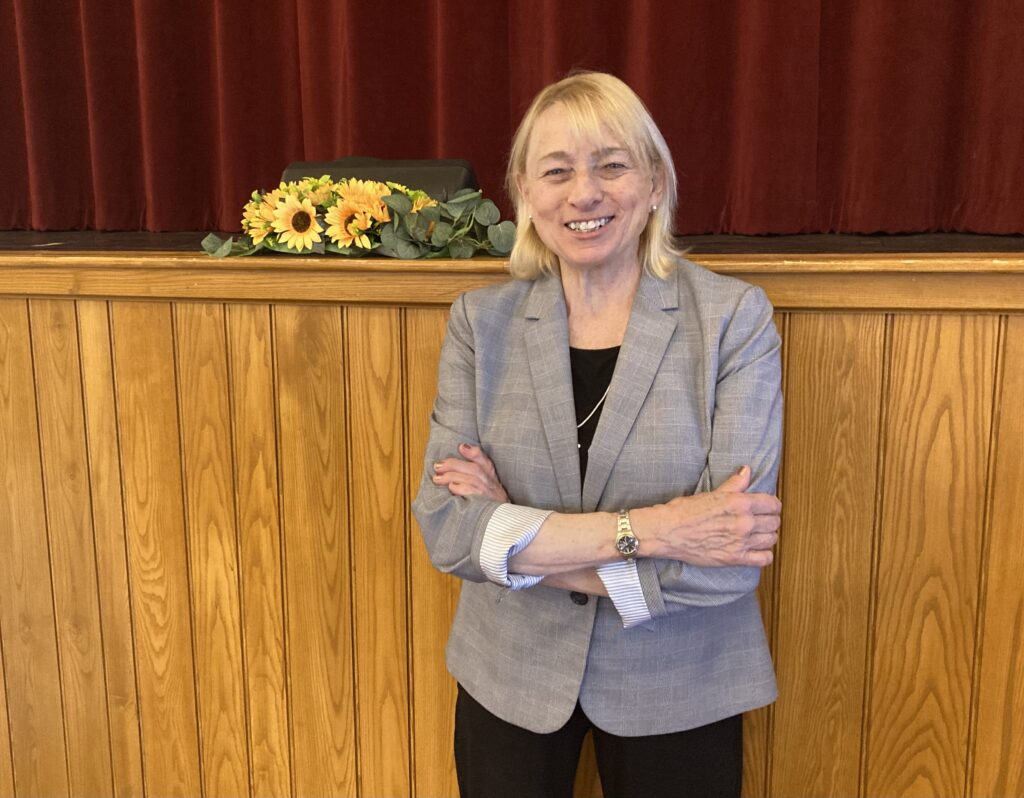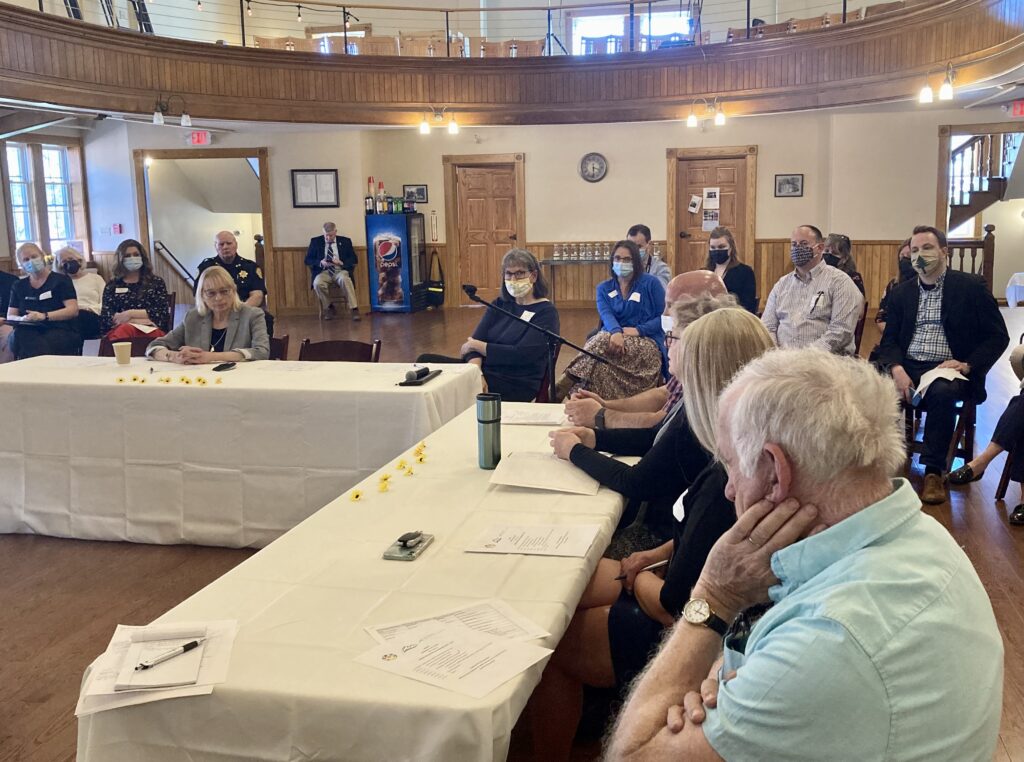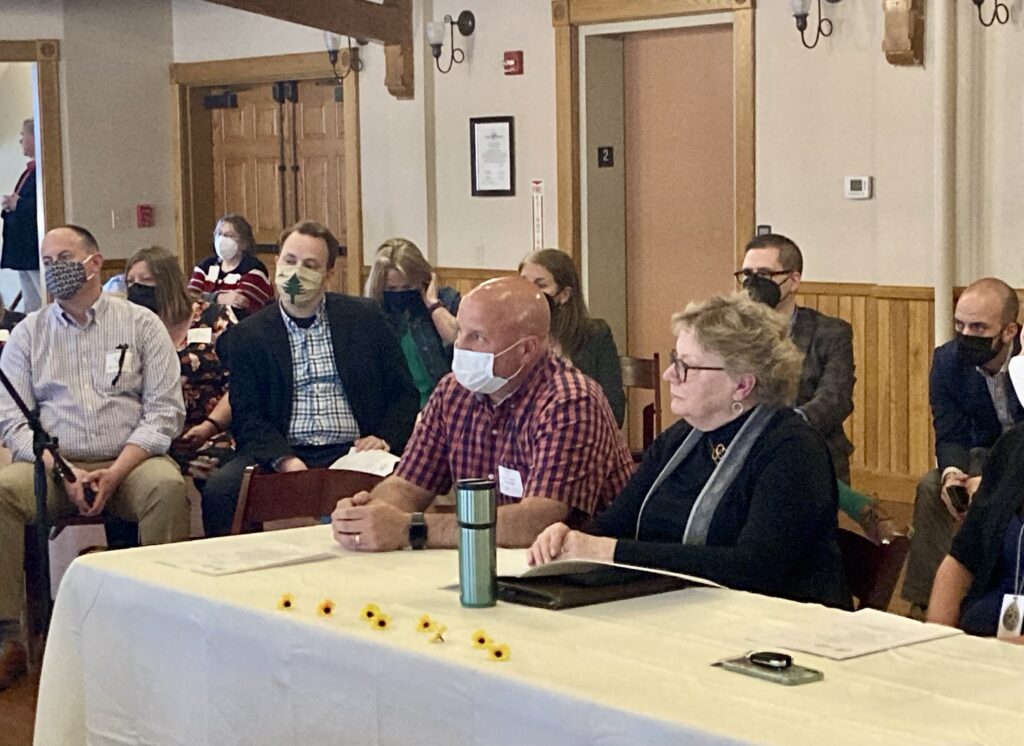
Piscataquis residents haven’t had regular state services since 2007
DOVER-FOXCROFT — Piscataquis County residents haven’t had regular access to state services since 2007, when a health services office in Dover-Foxcroft shuttered.
A coalition in Piscataquis County and members of the Maine Highlands Working Communities Challenge want to see state services, such as those related to careers and unemployment, public health, Department of Motor Vehicles and family planning, reinstated to aid residents locally and in neighboring Penobscot and Somerset county communities.
Those involved with the organizations have asked Gov. Janet Mills, who visited Piscataquis County on Wednesday, to help make their proposal a reality.

GOVERNOR’S VISIT – Gov. Janet Mills in Dover-Foxcroft on Wednesday.
Area residents are often forced to travel to places such as Bangor and Skowhegan to access motor vehicle and social services, or conduct their business online. This is problematic in a rural region with high poverty rates and a growing number of elderly citizens.
Barriers related to broadband, digital literacy and transportation often stand in their way, local community leaders and those involved with the organizations said. Access to essential state services would help the region close the gap on equity and aid struggling residents.
The groups envision a multiuse office, which could operate part-time, that combines essential state services and staff from existing offices in Penobscot and Somerset counties. It would provide a consistent physical state presence and would facilitate scheduling a more purposeful, regular transportation response from Penquis, according to the organizations’ request.
If executed well, the office could serve as a model for other rural communities.

ROUNDTABLE – Gov. Janet Mills visited several sites in Piscataquis County on Wednesday, ending with a roundtable discussion at Central Hall Commons in Dover-Foxcroft.
“One of the most common things that gets said about Piscataquis County and the Maine Highlands region is that we’re the oldest, poorest and sickest in the state,” said Sue Mackey Andrews, who is involved with both organizations.
Mills visited several sites in Piscataquis County on Wednesday, ending with a roundtable discussion at Central Hall Commons in Dover-Foxcroft. The governor met with community leaders involved with Helping Hands With Heart and the Maine Highlands Working Communities Challenge, along with town managers and state representatives.
They talked about economic development efforts through the Maine Highlands Working Communities Challenge, a partnership between the Federal Reserve Bank of Boston, state of Maine, philanthropy and private employers focused on strengthening the state’s rural communities.
The organizations outlined their request in a letter to Mills earlier this month, explaining the need for such services in the region, data and ideas for how changes could be made.

LISTENING SESSION – Dexter Town Manager Trampas King, left, and Sue Mackey Andrews, who is involved with Helping Hands With Heart and the Maine Highlands Working Communities Challenge, listen as Gov. Janet Mills speaks during a roundtable event Wednesday.
Helping Hands with Heart — a Piscataquis coalition that works to address food, emergency fuel and other needs of families in the region — has advocated for state services that residents can reach in their area without much travel since 2010, Andrews said. The Department of Health and Human Services office in Dover-Foxcroft closed in 2007, followed by Piscataquis County’s career center, she said.
About 20 percent of the region’s 28,000 people are considered children under the age of 21, Andrews said. About 27 percent are residents older than 65. “So we really are facing some substantial economic and human resource needs here,” she told Mills.
The region needs long-term solutions so that residents and businesses can thrive — particularly broadband to address spotty connectivity and affordability — and people should have a seat at the table regardless of their education or economic situation, said Andrew Bermudez, pastor at First Baptist Church in Dexter and chair of the Dexter Town Council.
Seana Collins, the AmeriCorps VISTA at Central Hall Commons, pointed to the need for low-income housing. Many buildings in disrepair are sitting untouched, she said. More education is also needed to show residents how to access benefits that the state provides.
Mills, who did not give the groups a solid answer on their request for a local office and state services, posed several questions, including some on the region’s assets and where participants saw their communities in the next five years.
Assets include the environment and beauty of the region, communities that care for each other despite their differences, and children, Andrews said. Small schools where teachers know the students and their families is another asset, Bermudez said. Rep. Paul Stearns mentioned the Penquis Higher Education Center in Dover-Foxcroft that offers a program to help people learn marketable job skills.
Some participants said they hope to see new businesses and families coming to the area, helping reverse the declining enrollment at local schools. But resources and jobs need to be available to them.
“What we have in Maine and in this region is quality of place,” Mills said, adding that she believes people realize their assets and that the school system will rebound. “The most popular word during the pandemic was ‘pivot.’ This community is pivoting to the future.”
The governor was pleased to see communities coming together to address issues before they get worse so that growth can happen in the future.
Mills promised to review the request for a local office that provides state services and other materials.
“There’s obviously consensus behind it,” she said. “We’ll look at the feasibility of doing something in the coming months.”